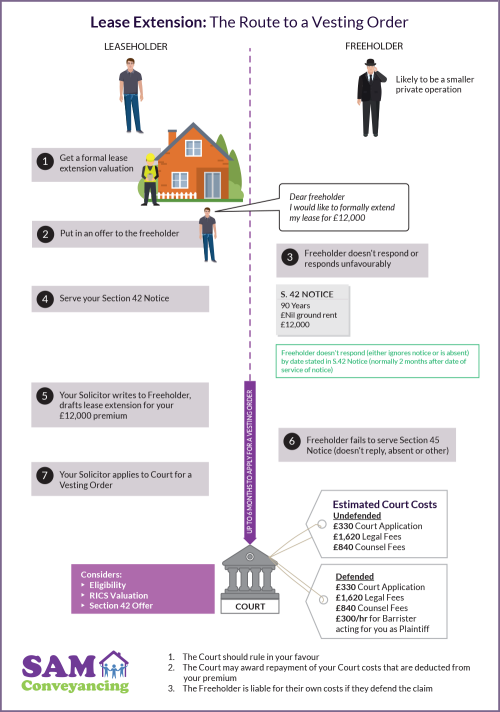What is a Vesting Order?
A Vesting Order is a specific court order used within the England and Wales leasehold system. It allows a lease extension or the purchase of a freehold interest to proceed under the statutory process when the freeholder (landlord) is either absent or fails to respond adequately to formal notices served by the leaseholder(s).
When a freeholder is missing or unresponsive, they cannot fulfil their legal obligations within the statutory leasehold process, such as acknowledging a claim or engaging in negotiations regarding the premium and terms.
In these situations, a Vesting Order from the County Court allows the court to step in and effectively act in place of the freeholder, ensuring that eligible leaseholders can still exercise their legal rights to extend their lease or buy their freehold.
Can you get a Vesting Order if you are informally extending your lease?
No, a Vesting Order is available only when you are pursuing a lease extension or freehold purchase through the formal statutory process under the Leasehold Reform, Housing and Urban Development Act 1993.
It cannot be obtained if you were attempting to extend your lease informally with the freeholder and they have become unresponsive.
If your freeholder is not responding to an offer for an informal lease extension, you would typically need to switch to the statutory process (if you are eligible) to be able to apply for a Vesting Order if their unresponsiveness continues.
When is a Vesting Order required? Circumstances and Legal Grounds
A Vesting Order from the County Court is necessary when the freeholder does not participate or respond to a lease extension claim as required by law. The need for a Vesting Order arises under different legal provisions depending on whether the freeholder is missing or simply unresponsive after being served notice.
The required counter-notices (for the freeholder to serve) are the Section 45 Counter-Notice for a lease extension or the Section 21 Counter-Notice for a collective enfranchisement claim.
Scenario 1: When the Freeholder is absent
This is when the absent freeholder or absentee landlord cannot be found or identified despite the leaseholder(s) undertaking all reasonable tracing efforts.
The legal basis for the court to grant a Vesting Order in this situation is primarily found in Section 50 of the Leasehold Reform, Housing and Urban Development Act 1993. This section allows the statutory process to bypass the requirement of serving notices on a missing landlord.
This is applicable for Section 42 and Section 23 Notices (for a lease extension and collective enfranchisement, respectively).
Scenario 2: The Freeholder fails to respond to the Statutory Notice
This is where the freeholder, having been correctly served with a statutory initial notice (Section 42 for a lease extension, Section 13 for collective enfranchisement), fails or refuses to serve their counter-notice within the statutory timeframe set by the 1993 Act (typically two months).
The legal basis here is Section 49 of the 1993 Act, which allows the leaseholder(s) to apply to the court to determine the terms of the claim based on their initial proposal.
In addition to Section 49, the court's power to make a Vesting Order in these default cases is supported by principles from the Trustees Act 1925.
Specifically, the court may deem the freeholder's failure to act for a period (often considered to be 28 days after the 1993 Act deadline expires) as "wilful refusal or neglect" (as per Section 44(vi) of the 1925 Act), providing grounds to make the Vesting Order.

- Fixed Fees.
- Leasehold Specialist Solicitors.
- RICS Surveyor Negotiations.
- Complicated jargon made simple.
- Preparation and serving of Section 42 Notice.
The Vesting Order Process: When the Freeholder is unresponsive
If your freeholder has been correctly served with a statutory notice but fails or refuses to serve the required counter-notice within the legal timeframe, you will need to apply to the County Court for a Vesting Order.
This process follows on from the initial stages of your statutory lease extension or collective enfranchisement claim. Here are the typical steps involved:
- 1
Expiration of Statutory Period
If the freeholder fails to serve their counter-notice within the two-month period under the 1993 Act, and they continue to be unresponsive for a further period (often considered to be 28 days, aligning with principles from the Trustees Act 1925 regarding wilful refusal or neglect), they are deemed to be in default, and you can proceed with the Vesting Order application.
- 2
Prepare your Vesting Order application
- You are an eligible leaseholder.
- The initial statutory notice (S42/S13) was validly served on the freeholder.
- The statutory timeframe for the counter-notice has expired.
- The freeholder has failed to serve the counter-notice and is unresponsive.
With the freeholder in default, your solicitor will prepare the application for a Vesting Order to the County Court. This typically involves completing a Part 8 claim form and preparing a detailed evidence bundle. The evidence must satisfy the court that:
- 3
Proving the notice was served
- Special Delivery: Provides tracking and signature confirmation.
- Courier: Offers tracked delivery and often includes a witness statement from the courier.
- Hand Delivery: Requires a reliable witness to confirm delivery.
Proving correct service of the initial notice is critical to the court application. To avoid disputes about whether the freeholder received the notice, solicitors typically use methods that provide proof of delivery, such as:
Evidence of service (e.g., postal receipts, courier confirmations, witness statements) must be included in your court application. At SAM, there will always be record and proof of all activities with our panel of solicitors.
- 4
County Court Vesting Order
The County Court will review your application and evidence. If the court is satisfied that the freeholder is in default and you have met the legal requirements, they will grant a Vesting Order.
Under Section 49 of the 1993 Act, the court's order will usually determine the terms of the lease extension or freehold purchase in accordance with the proposals set out in your original initial notice.
The court will then typically refer the case to the First-tier Tribunal (Property Chamber) for the determination of the premium payable.
In many undefended cases where the evidence is clear, the court may make the order without a formal hearing.
- 5
First-tier Tribunal Determination
The Tribunal's role is to formally determine the statutory premium you must pay for the lease extension or freehold, based on the terms derived from your initial notice as ordered by the court. They will consider your valuation report and issue a determination.
- 6
Final Vesting Order and Completion
Once the Tribunal has determined the premium, the case returns to the County Court. The court will issue the final Vesting Order, which facilitates the legal completion of the lease extension or freehold transfer in the absence of the freeholder. The determined premium is usually paid into court, held in case the freeholder later reappears to claim it.

How long does a Vesting Order take?
While there is no single definitive timeframe, the process can range from typically around 9 months in simpler failure-to-respond cases to 18 months or upwards for complex absent freeholder situations.
Here's a breakdown of estimated timelines for each scenario:
If the Freeholder fails to respond to Statutory Notices
In this scenario, the process involves the initial statutory notice periods, waiting for the freeholder to fail to serve the counter-notice (the statutory two months plus a further period before deeming default), applying to the County Court, and the subsequent First-tier Tribunal determination and final court order.
While you avoid the time-consuming tracing efforts needed for an absent freeholder, these legal and tribunal stages still add time compared to a standard statutory process with a responsive freeholder.
An estimated timeline from serving the initial statutory notice to completion in this scenario might typically range from 9 to 15 months, but this can be highly variable depending on court and tribunal workloads and the specifics of the case.
If the Freeholder is absent
When the freeholder is genuinely missing and cannot be traced, the process is generally longer than the failure-to-respond scenario. It involves tracing efforts, the County Court process for proving absence and getting the initial Vesting Order, the referral to the Tribunal for premium determination, and final completion.
This adds significant time for the tracing and the court being satisfied with the absence. Timelines in absent freeholder cases often range from 12 to 18 months or even longer.
It is important to view these timeframes as estimates. The actual duration can be influenced by factors such as the complexity of your case, how quickly your legal and valuation professionals work, and the current caseloads at the County Court and the First-tier Tribunal (Property Chamber).
If you're wanting to sell a leasehold property and you know that your landlord is absent, factor these timings into your long-term plans. Start the process now if you're planning to move within the next two years or so.
- RICS-accredited surveyors for the lease premium.
- Fixed, competitive fees.
- Solicitors to serve the Section 42 Notice.
- Expert negotiations with your Freeholder
- Full management of the entire lease extension process.
- First-tier Tribunal representation (if required).
- Combined surveyor and solicitor leasehold services.

Costs of obtaining a Vesting Order
While exact costs vary significantly, the total estimated additional costs for the Vesting Order process itself can range from approximately £2,000 in simpler cases (such as a straightforward, undefended failure-to-respond) to £8,500 or significantly more for more complex scenarios (such as those requiring extensive tracing or involving contested hearings).
These additional costs cover the necessary legal work, court fees, and tribunal fees. The exact total cost within this range can vary depending on whether the freeholder is absent or simply failing to respond, the complexity of your case, and the specific professionals you instruct. However, the main components of these additional costs typically include:
Type | Description | Cost |
|---|---|---|
Type Solicitor's Fees | Description Covering the legal work involved in preparing the court application for the Vesting Order (often a Part 8 claim), gathering necessary evidence (like proof of notice service), dealing with court procedures, and preparing for the Tribunal determination. | Cost £1,500 to £5,000 |
Type County Court Fees | Description There is a mandatory court application fee to file the Vesting Order application in the County Court. | Cost £377 to £404 |
Type First-tier Tribunal (Property Chamber) Fees | Description You will need to apply to the Tribunal for premium determination. This involves an application fee and potentially a hearing fee if the Tribunal requires a hearing. | Cost £110 for the application fee and £220 for the hearing fee |
Type Counsel's Fees | Description Your solicitor may instruct a barrister (Counsel) to represent you at any court hearing, although in straightforward, undefended cases, a hearing may not be required. Counsel's fees will be an additional cost if their services are needed. | Cost Variable |
Type Tracing and Advertisement Costs | Description These costs are specific to absent freeholder cases and cover professional tracing agent fees and newspaper advertisements to prove the freeholder is missing. The costs vary depending on the difficulty of tracing. | Cost £100s to £1000+ |
Can costs be reclaimed from the Freeholder?
Whether you can reclaim the costs incurred in obtaining a Vesting Order depends on the scenario:
- If the Freeholder Fails to Respond:
In this scenario, where the freeholder has defaulted by not serving a counter-notice, the County Court will typically order the defaulting landlord to pay the leaseholder's reasonable costs for the Vesting Order application and the Tribunal determination. These costs are usually deducted from the premium payable for the lease extension or freehold purchase.
For example, if the premium determined by the Tribunal is £20,000 and your reasonable costs for the Vesting Order process (legal, court, tribunal fees, etc.) are £2,000, the court may order these costs to be deducted, meaning you would effectively pay £18,000.
- If the Freeholder is Absent:
In absent freeholder cases, the situation regarding cost recovery is less straightforward, and you are typically responsible for your own legal, tracing, advertising, court, and tribunal fees. While some limited costs related to the court application might potentially be recoverable from the premium held by the court, this is not guaranteed and does not cover all your expenses. More detailed information on costs in absent freeholder cases can be found in our dedicated article.
Andrew started his career in 2000 working within conveyancing solicitor firms and grew hands-on knowledge of a wide variety of conveyancing challenges and solutions. After helping in excess of 50,000 clients in his career, he uses all this experience within his article writing for SAM, mainstream media and his self published book How to Buy a House Without Killing Anyone.
Caragh is an excellent writer and copy editor of books, news articles and editorials. She has written extensively for SAM for a variety of conveyancing, survey, property law and mortgage-related articles.









